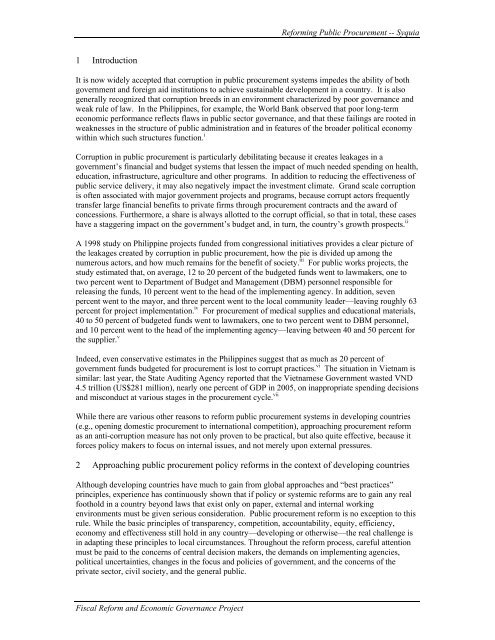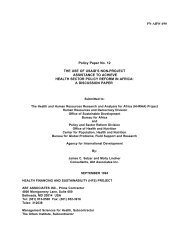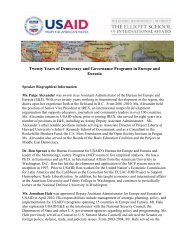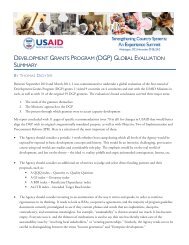Reforming Public Procurement in Emerging Market ... - KDID Portal
Reforming Public Procurement in Emerging Market ... - KDID Portal
Reforming Public Procurement in Emerging Market ... - KDID Portal
Create successful ePaper yourself
Turn your PDF publications into a flip-book with our unique Google optimized e-Paper software.
<strong>Reform<strong>in</strong>g</strong> <strong>Public</strong> <strong>Procurement</strong> -- Syquia<br />
1 Introduction<br />
It is now widely accepted that corruption <strong>in</strong> public procurement systems impedes the ability of both<br />
government and foreign aid <strong>in</strong>stitutions to achieve susta<strong>in</strong>able development <strong>in</strong> a country. It is also<br />
generally recognized that corruption breeds <strong>in</strong> an environment characterized by poor governance and<br />
weak rule of law. In the Philipp<strong>in</strong>es, for example, the World Bank observed that poor long-term<br />
economic performance reflects flaws <strong>in</strong> public sector governance, and that these fail<strong>in</strong>gs are rooted <strong>in</strong><br />
weaknesses <strong>in</strong> the structure of public adm<strong>in</strong>istration and <strong>in</strong> features of the broader political economy<br />
with<strong>in</strong> which such structures function. i<br />
Corruption <strong>in</strong> public procurement is particularly debilitat<strong>in</strong>g because it creates leakages <strong>in</strong> a<br />
government’s f<strong>in</strong>ancial and budget systems that lessen the impact of much needed spend<strong>in</strong>g on health,<br />
education, <strong>in</strong>frastructure, agriculture and other programs. In addition to reduc<strong>in</strong>g the effectiveness of<br />
public service delivery, it may also negatively impact the <strong>in</strong>vestment climate. Grand scale corruption<br />
is often associated with major government projects and programs, because corrupt actors frequently<br />
transfer large f<strong>in</strong>ancial benefits to private firms through procurement contracts and the award of<br />
concessions. Furthermore, a share is always allotted to the corrupt official, so that <strong>in</strong> total, these cases<br />
have a stagger<strong>in</strong>g impact on the government’s budget and, <strong>in</strong> turn, the country’s growth prospects. ii<br />
A 1998 study on Philipp<strong>in</strong>e projects funded from congressional <strong>in</strong>itiatives provides a clear picture of<br />
the leakages created by corruption <strong>in</strong> public procurement, how the pie is divided up among the<br />
numerous actors, and how much rema<strong>in</strong>s for the benefit of society. iii For public works projects, the<br />
study estimated that, on average, 12 to 20 percent of the budgeted funds went to lawmakers, one to<br />
two percent went to Department of Budget and Management (DBM) personnel responsible for<br />
releas<strong>in</strong>g the funds, 10 percent went to the head of the implement<strong>in</strong>g agency. In addition, seven<br />
percent went to the mayor, and three percent went to the local community leader—leav<strong>in</strong>g roughly 63<br />
percent for project implementation. iv For procurement of medical supplies and educational materials,<br />
40 to 50 percent of budgeted funds went to lawmakers, one to two percent went to DBM personnel,<br />
and 10 percent went to the head of the implement<strong>in</strong>g agency—leav<strong>in</strong>g between 40 and 50 percent for<br />
the supplier. v<br />
Indeed, even conservative estimates <strong>in</strong> the Philipp<strong>in</strong>es suggest that as much as 20 percent of<br />
government funds budgeted for procurement is lost to corrupt practices. vi The situation <strong>in</strong> Vietnam is<br />
similar: last year, the State Audit<strong>in</strong>g Agency reported that the Vietnamese Government wasted VND<br />
4.5 trillion (US$281 million), nearly one percent of GDP <strong>in</strong> 2005, on <strong>in</strong>appropriate spend<strong>in</strong>g decisions<br />
and misconduct at various stages <strong>in</strong> the procurement cycle. vii<br />
While there are various other reasons to reform public procurement systems <strong>in</strong> develop<strong>in</strong>g countries<br />
(e.g., open<strong>in</strong>g domestic procurement to <strong>in</strong>ternational competition), approach<strong>in</strong>g procurement reform<br />
as an anti-corruption measure has not only proven to be practical, but also quite effective, because it<br />
forces policy makers to focus on <strong>in</strong>ternal issues, and not merely upon external pressures.<br />
2 Approach<strong>in</strong>g public procurement policy reforms <strong>in</strong> the context of develop<strong>in</strong>g countries<br />
Although develop<strong>in</strong>g countries have much to ga<strong>in</strong> from global approaches and “best practices”<br />
pr<strong>in</strong>ciples, experience has cont<strong>in</strong>uously shown that if policy or systemic reforms are to ga<strong>in</strong> any real<br />
foothold <strong>in</strong> a country beyond laws that exist only on paper, external and <strong>in</strong>ternal work<strong>in</strong>g<br />
environments must be given serious consideration. <strong>Public</strong> procurement reform is no exception to this<br />
rule. While the basic pr<strong>in</strong>ciples of transparency, competition, accountability, equity, efficiency,<br />
economy and effectiveness still hold <strong>in</strong> any country—develop<strong>in</strong>g or otherwise—the real challenge is<br />
<strong>in</strong> adapt<strong>in</strong>g these pr<strong>in</strong>ciples to local circumstances. Throughout the reform process, careful attention<br />
must be paid to the concerns of central decision makers, the demands on implement<strong>in</strong>g agencies,<br />
political uncerta<strong>in</strong>ties, changes <strong>in</strong> the focus and policies of government, and the concerns of the<br />
private sector, civil society, and the general public.<br />
Fiscal Reform and Economic Governance Project







